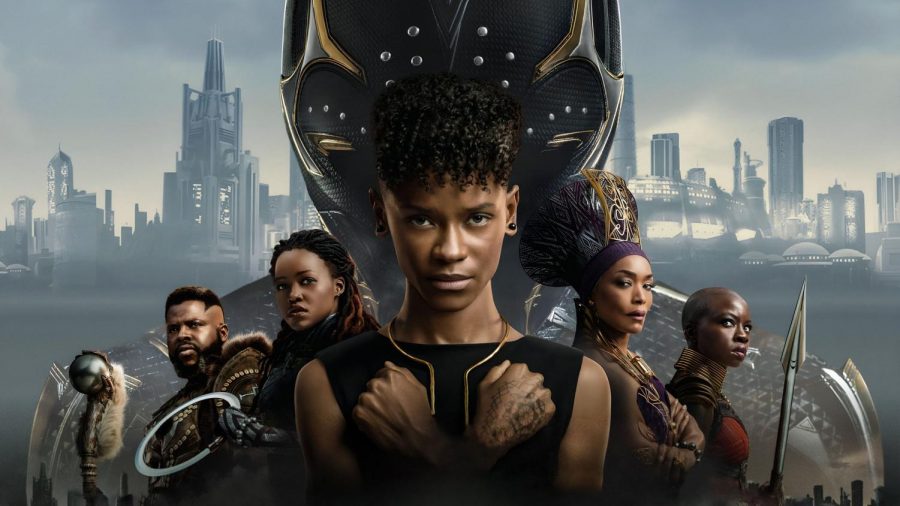Black Panther: Wakanda Forever Review
Poster for Black Panther: Wakanda Forever.
Warning: Spoilers ahead.
Black Panther: Wakanda Forever is now officially in theaters.
After the cultural phenomenon of the first Black Panther, anticipation was high for the sequel. When COVID-19 hit, production of the long-awaited sequel was paused, causing more complications for the film. And then, on August 28, 2020, lead actor Chadwick Boseman passed away from stage IV colon cancer.
The shocking tragedy emotionally wrecked the film world and the Marvel community. Boseman was diagnosed with stage III colon cancer in 2016, meaning he shot all of Black Panther while fighting his illness. He also kept the diagnosis a secret from everyone besides his family, meaning the cast and crew were unaware that he was sick.
Ryan Coogler, director of Black Panther, had no idea how he was going to continue work on the sequel. At a certain point, the grief of losing Boseman was so much that he became unsure if he could continue making movies. However, Coogler remembered all of the stunts and difficult things Boseman did in the first Black Panther despite being sick with cancer, and this motivated him to push through the grief and hardship and make Black Panther: Wakanda Forever.
When Marvel announced that Chadwick Boseman would not be recast, curiosity spiked. And, in July of 2022, the first trailer for Black Panther: Wakanda Forever was released, giving audiences their first look at this meaningful film that both honors Boseman’s legacy and continues the work he established in the first Black Panther.
And now, five months later, Wakanda Forever is out. And, beyond people just wondering if the film is good, the question circling Hollywood is simple: Does this film work as a respectful tribute to Chadwick Boseman?
And the answer is yes. Black Panther: Wakanda Forever serves as a two-hour and forty-one-minute film that is entirely dedicated to honoring the late actor’s legacy. The film essentially plays out like a traditional Marvel movie with big action set pieces, lots of superheroes, and even the normal after-credits scene, but every single element of this film is injected with the weight and sadness that stems from Chadwick Boseman’s passing.
The film begins with the death of T’Challa himself, immediately establishing the somber tone that will be present throughout the runtime. From there, the iconic Marvel logo rolls. While the usual logo shuffles through images of Captain America, Iron Man, Black Widow, and other heroes in the Marvel universe while accompanied by a loud, triumphant fanfare, this logo only shows images of Chadwick Boseman and his time as T’Challa. And the fanfare? Exchanged for total silence.
The Marvel logo isn’t the only thing that Black Panther: Wakanda Forever honors Chadwick Boseman with. The film shows the main characters in a state of heavy grief while also giving us a look at Wakanda without its protector. While T’Challa’s family is processing the loss of a son, a brother, and a girlfriend, Wakanda is processing the loss of a king. The performances all portray a state of grief with this sense of realism. All of the actors are in just as much grief as the characters. Angela Bassett, who plays Queen Ramonda, T’Challa’s mother, gives a powerful and emotional performance that has real weight and emotion behind it. By channeling their grief from Boseman’s death, the actors are able to accurately portray the emotions that their characters are feeling.
The film plays out with a weakened Wakanda facing off against invading countries. The most threatening invaders are the Talokan, a group of underwater mutants led by their centuries-old ruler, Namor. Like T’Challa, Namor will do anything to protect his nation, and he makes this clear to the Wakandans. He asks them to stand down and not fight him, but they refuse. This results in Namor flooding Wakanda and drowning Queen Ramonda.
In the comics, Namor is an anti-hero that often sides with the Avengers but is constantly at odds with Black Panther and Wakanda. Coogler wanted to introduce Namor in the sequel to Black Panther before Boseman died and stuck with that idea after. Namor’s representation in this movie is a cool blend of the character from the comics with a new, Aztec-inspired mythology that adds so much to his character in this film. He’s also portrayed by Mexican actor Tenoch Huerta, who does a fantastic job of playing a menacing villain while also providing representation for the Latino community in the Marvel Cinematic Universe.
With the loss of her mother and brother now on her mind, Princess Shuri takes over as queen of Wakanda. In a vengeful state, she quickly re-creates the heart-shaped herb that gave T’Challa the powers of the Black Panther. With this, Shuri becomes the Black Panther, but not the noble, heroic one that T’Challa was. She’s been swallowed by vengeance and looks to kill Namor and get revenge for the death of her mother.
This is an example of a plot point that was in the original script that is now much heavier because of Boseman’s passing. Ramonda’s death is already a sad occurrence, but it takes on so much more weight because T’Challa is gone. The audience feels the raw emotion of Ramonda’s death combined with T’Challa’s through Shuri. It’s a powerful and sad way to continue the Black Panther saga.
In the final battle, Shuri nearly kills Namor before realizing that she isn’t a vengeful person. She becomes like her late brother and spares Namor’s life, ending the war between Wakanda and the Talokan. Shuri, now having become what her brother would want, takes some time to process and grieve T’Challa’s loss, while the audience takes time to process and grieve Chadwick Boseman’s loss. The film ends with a montage of clips of Chadwick Boseman accompanied (again) by silence, closing the book on a deeply powerful and resonant film. These final few minutes allow Shuri time to grieve and process T’Challa’s passing while also allowing the audience to process Boseman’s.
But wait! The after-credits. After the initial credits roll, we cut back to Shuri as Nakia, T’Challa’s girlfriend walks up to her with a young boy. This young boy is Toussaint, the secret son of Nakia and T’Challa. As Shuri meets this young boy, he reveals that his true name is Prince T’Challa, son of King T’Challa. This after-credits scene is as emotional as the rest of the movie, honoring Boseman’s legacy while preparing to move forward in a world without him.
Black Panther: Wakanda Forever serves as a sequel to the first Black Panther while also being a film that is all about the processing of grief and how to move forward after an unimaginable tragedy. While T’Challa’s death affects the fictional world of the MCU, Chadwick Boseman’s death affects the real world, and suddenly, this fantastical world full of superheroes collides with the real world to honor the legacy of a king and an icon.

Hey everyone! My name is Aiden. I’m so excited to be your copy editor this upcoming year! I am a senior and this is my third year on the staff of the...







